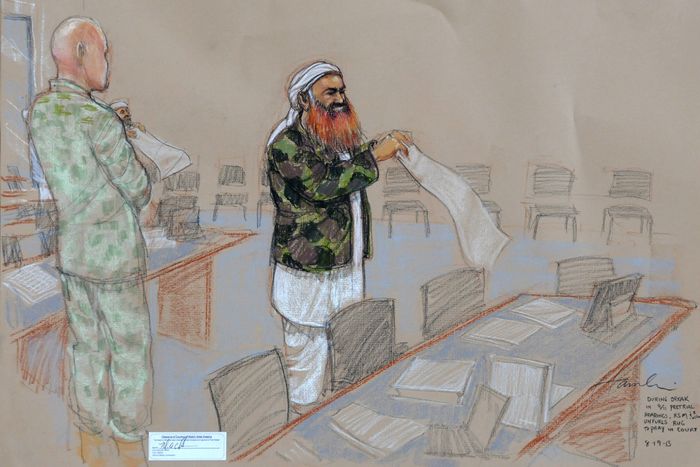WASHINGTON—Military prosecutors have begun plea negotiations at Guantanamo Bay with
Khalid Sheikh Mohammed
and four co-defendants accused of orchestrating the Sept. 11, 2001, terrorist attacks, a deal under which the defendants would admit guilt and prosecutors forgo pursuit of a death sentence, defense attorneys said.
If successful, the negotiations could end a legal saga that has lasted nearly two decades, beginning with the capture in Pakistan of Mr. Mohammed, the alleged mastermind of the attacks. Mr. Mohammed and other detainees were allegedly tortured in overseas “black site” interrogation centers and were finally interned in the high-security prison at Guantanamo Bay, where a seemingly irreconcilable conflict between fairness to the accused and deference to the Central Intelligence Agency’s secrets has stymied trials for years.
“Negotiated agreements represent one path to ending military commissions, stopping indefinite detention at Guantanamo Bay, and providing justice,” said attorney
Alka Pradhan,
who represents one of the defendants,
Ali Abdul Aziz Ali,
also known as
Ammar al-Baluchi.
A Pentagon spokesman declined to comment. Representatives for the Justice Department didn’t immediately respond to requests for comment.

A 2013 courtroom sketch of Khalid Sheikh Mohammed, the alleged mastermind of the Sept. 11 attacks.
Photo:
Janet Hamlin/Associated Press
The discussions, reported earlier by the
New York Times,
may be different for each of the five detainees, according to a person familiar with the matter. The others are
Walid bin Attash,
Ramzi Binalshibh
and
Mustafa al Hawsawi.
Figures considered more peripheral to the plot, such as Mr. Hawsawi and Mr. al-Baluchi, may seek more lenient terms, including the possibility of eventual release or the chance to serve their sentences in other countries, the person said. In the past, plans to try the Sept. 11 defendants in federal court or negotiate plea deals were scuttled after political blowback or opposition from senior officials.
The military commissions now operating at Guantanamo descend from former President
George W. Bush’s
November 2001 order authorizing tribunals to try noncitizens accused of war crimes without regard to constitutional protections or appeals to the federal courts. The Supreme Court voided that plan in 2006 and since then successive acts of Congress retooled military commissions to more closely resemble courts-martial, where U.S. service members are tried.
But many legal questions remain unresolved, including which constitutional rights apply in military commissions. The prosecutions remain mired in pretrial hearings that have focused on the degree to which evidence of the defendants’ treatment in CIA custody can be weighed in evaluation of the government’s case and in mitigation of potential punishment.
There has been little debate regarding the defendants’ guilt. In 2008, saying they sought martyrdom, the five men attempted to plead guilty in an earlier iteration of the commission system. A military judge, unsure of whether capital defendants were permitted to plead guilty, declined to accept the pleas, and the proceedings later were restarted under a modified framework.
Because the defendants’ treatment stands beyond the bounds of any legal system—a Senate Intelligence Committee report said Mr. Mohammed was waterboarded at least 183 times—defense lawyers have suggested they would argue the government should be sanctioned by removing the death penalty from consideration.
Aware that a military jury or appellate court could make such findings, in 2017 the then-head of the military commissions apparatus,
Harvey Rishikof,
began exploring a potential plea deal. After word spread, then-Defense Secretary
Jim Mattis
dismissed Mr. Rishikof for what Mr. Mattis said were unrelated reasons.
The circumstances now, however, are different. While the legal obstacles to a capital trial remain, several longtime commissions prosecutors, including Brig. Gen.
Mark Martins
and
Robert Swann,
have since retired. President Biden opposes both the death penalty and the continued operation of Guantanamo Bay.
Earlier this month, the U.S. repatriated to Saudi Arabia detainee
Mohammed al-Qahtani,
the alleged 20th hijacker authorities believed would have joined the terrorists on United 93 had an immigration officer not refused him entry at Orlando International Airport in August 2001.
Mr. al-Qahtani initially had been slated to be charged along with the current Sept. 11 defendants; a row for him was built in the Guantanamo courtroom. In 2009, the military commissions head dismissed charges against Mr. Qahtani after finding he had been tortured while in military custody.
Write to Jess Bravin at [email protected]
Copyright ©2022 Dow Jones & Company, Inc. All Rights Reserved. 87990cbe856818d5eddac44c7b1cdeb8
George is Digismak’s reported cum editor with 13 years of experience in Journalism